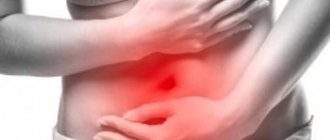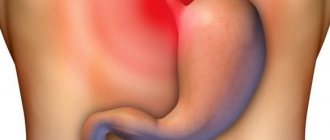What are the causes of stomach pain?
An enlarged uterus can cause reflux
In pregnant women, stomach pain is mainly caused by multiple factors that have varying levels of danger. One of the most well-known factors is the uterus, which grows over time. This is what causes stomach pain. The uterus constantly displaces organs, and, accordingly, the human gastrointestinal tract. An enlarged uterus can cause reflux.
In addition to this, other factors can cause stomach pain:
- stress
- overeating, which is typical for pregnant girls
- hunger (after long gaps between meals)
- small amount of gastric juice secreted
- heartburn
- constipation or stool
- when the abdominal muscles are tense, toxicosis occurs, caused by pain
Every girl’s body feels stress during pregnancy, and since it is weak during this period of time, it is very sensitive. A girl can easily catch various infections caused by bacteria and fungi.
Also, most pregnant women develop various allergies to certain foods that contribute to stomach pain. More than half of pregnant girls suffer from gastrointestinal tract, stomach ulcers, liver problems, and the most common - gastritis.
Which is normal, but you should pay attention
Nausea and vomiting
Occurs in every 3rd pregnancy.
In 90% of cases, nausea and vomiting in pregnant women are a physiological sign of pregnancy, in 10% - a complication of pregnancy. During normal pregnancy, vomiting occurs no more than 2-3 times a day, more often on an empty stomach, and does not disturb the general condition of the patient.
In most cases, nausea and vomiting resolve on their own by 16-20 weeks of pregnancy and do not worsen its outcome.
Recommendations:
Fractional meals, small portions, exclusion from the diet of fatty, fried foods, chocolate, spicy foods, carbonated drinks, coffee, strong tea.
To reduce nausea in early pregnancy, ginger, chamomile, and vitamin B6 preparations are recommended.
Soreness and engorgement of the mammary glands
It is a normal symptom during pregnancy, observed in most women in the 1st trimester of pregnancy and is associated with swelling and engorgement of the mammary glands due to hormonal changes.
Pain in the lower abdomen can be normal during pregnancy, such as when the ligamentous apparatus of the uterus is stretched during its growth (aching pain or sudden stabbing pain in the lower abdomen) or during Braxton-Higgs training contractions after the 20th week of pregnancy (pulling pain in the lower abdomen abdomen, accompanied by uterine tone, lasting up to a minute, not having a regular character).
Heartburn
Heartburn (gastroesophageal reflux disease during pregnancy is observed in 20-80% of cases.
More often it develops in the 3rd trimester of pregnancy.
Heartburn occurs due to relaxation of the lower esophageal sphincter, a decrease in intraesophageal pressure, and a simultaneous increase in intra-abdominal and intragastric pressure, which leads to repeated reflux of gastric and/or duodenal contents into the esophagus.
Recommendations:
Avoid body positions that contribute to heartburn; diet; wearing loose clothing that does not put pressure on the stomach area.
If there is no effect from diet and lifestyle, enveloping and astringent drugs may also be prescribed.
Constipation
The most common intestinal pathology during pregnancy occurs in 30-40% of cases.
Constipation is associated with impaired passage through the colon and is characterized by a stool frequency of less than 3 times a week.
They are accompanied by at least one of the following signs: a feeling of incomplete bowel movement, a small amount and dense consistency of stool, straining for at least a quarter of the time of defecation.
The reasons for the development of constipation during pregnancy are an increase in the concentration of progesterone, a decrease in the concentration of motilin and changes in blood supply and neurohumoral regulation of the intestines.
Recommendations:
Correction of nutrition, to eliminate constipation, wheat bran or other sources of dietary fiber may be prescribed.
Haemorrhoids
Approximately 8-10% of women develop hemorrhoids during each pregnancy.
The reasons for the development of hemorrhoids during pregnancy may be: pressure on the intestinal walls from the uterus, congestion in the portal vein system, increased intra-abdominal pressure, congenital or acquired weakness of connective tissue, changes in the innervation of the rectum.
Recommendations:
If there is no effect from following the constipation prevention regimen, it is recommended to prescribe antihemorrhoidal drugs in the form of rectal suppositories or creams.
Varicose veins
Develops in 20-40% of pregnant women.
The reason for the development of varicose veins during pregnancy is an increase in venous pressure in the lower extremities and the relaxing effect of progesterone, relaxin and other biologically active substances on the vascular wall of the veins.
Recommendations:
Wearing compression hosiery, physical therapy sessions and a contrast shower, elevated position of the legs, with pronounced dilation of the veins of the lower extremities, consultation with a vascular surgeon.
Discharge
Vaginal discharge without itching, pain, unpleasant odor or dysuria is a normal symptom during pregnancy and is observed in most women.
Symptoms of stomach pain during pregnancy
The pain starts suddenly and goes away the same way
Stomach pain can occur in different ways, and not everyone experiences it the same way. Every pregnant girl will have different symptoms. Mostly pain appears in the form of contractions, which is a consequence of gastritis, neurosis or something else. Gastric pain appears in the area between the 3rd and 4th ribs on the left side, or in other words in the epigastric region.
Stomach pain does not cause much pain, but it does cause discomfort and inconvenience. It starts suddenly and goes away just like that. This is a completely standard situation for pregnant girls and women, and is not dangerous for them. Everything happens due to some changes in the pregnant body.
What are the causes of gastritis during pregnancy?
The main causes that cause gastritis are:
- Binge eating
- Poor nutrition, more precisely, irregular meals, poor chewing
- Consumption of alcoholic beverages and tobacco products
- Drug abuse
- Disease caused by various bacteria and viruses.
- Consumption of products with flavors, preservatives and dyes
- Stress
The symptoms of acute and chronic gastritis are very similar, so do not confuse them.
gastritis does not affect pregnancy in any way
Signs of chronic gastritis are heartburn, sour belching, burning sensation in the body, heartburn, heaviness in the stomach, which is expressed within two hours after eating.
Acute gastritis can occur as a result of various allergies, infections and burns in the stomach. With it, a person feels pain and heaviness, belching, diarrhea, nausea and vomiting occur. If you press on the stomach, you can feel pain. Gastritis often changes from acute to chronic.
Despite the deteriorated condition of the pregnant girl, as well as the severity of the disease, the fetus develops completely without problems, so gastritis does not affect pregnancy in any way. There are cases when gastritis is not noticeable, when it does not bother a person. And terrible things are happening in his body, or rather in his stomach!
If gastritis is noticed too late, it may be too dangerous for a pregnant woman. After all, severe gastritis can result in hemorrhages from the stomach and duodenum.
Uterine tone
Heaviness in the lower abdomen in early pregnancy may be associated with pathological tension in the muscles of the reproductive organ. The uterus consists of three membranes. The middle membrane (myometrium) has the ability to contract. This property plays an important role during labor. In this way, the uterus “pushes” the baby out and helps him to be born. However, the myometrium can contract long before birth. This condition is called uterine tone.
The pathological process can be very dangerous. In early pregnancy, uterine tone often provokes spontaneous miscarriage. In the second half of gestation, deviation can cause premature birth. Increased uterine tone at any stage inhibits the normal development of the fetus. During muscle tension, blood vessels are pinched, and the child does not receive enough oxygen and other nutrients. Often, tone leads to stunted growth of the baby inside the womb.
If toxicosis is the body’s reaction to excessive production of progesterone, then uterine hypertonicity develops more often with a lack of this hormone. Although toxicosis itself can also provoke uterine tension. During vomiting, the muscles of the abdomen, as well as the gastrointestinal tract, tense.
Another danger for a woman and her child can be Rh conflict. More often, this situation develops with negative Rh in the mother and positive in the fetus. The woman’s body does not accept the baby and rejects it. The uterus adjusts to the expulsion of the fetus and becomes toned.
Treatment of uterine tone in the early stages
Tone can provoke overwork and stress. Distension in the abdomen often occurs during prolonged walking. If the heaviness in the abdomen is insignificant, a pregnant woman should rest more and avoid excessive physical exertion. If there is no pain or bleeding from the genital tract, a warm bath will help to relax the uterus.
Good nutrition and proper daily routine will help reduce the risk of developing uterine tone. A woman should get a good night's sleep. If the work involves increased workload, you must inform your employer about your situation.
With severe hypertonicity of the uterus, the expectant mother is advised to go to bed. There is a threat of miscarriage, so the woman is hospitalized in the gynecological department. If, in addition to heaviness in the abdomen, cramping pain or bleeding from the vagina appears, you should immediately seek medical help.
Therapy is carried out using sedatives (tincture of motherwort, valerian), as well as progesterone-based drugs (Utrozhestan, Duphaston). Antispasmodics are used to relax the muscles of the reproductive organ. Therapy in a medical facility is carried out under the control of blood sugar, blood pressure, and kidney parameters.
If pregnancy occurs after a miscarriage or long-term infertility treatment, the likelihood of developing uterine hypertonicity increases. Therefore, it is necessary to consult a doctor only when a slight heaviness in the abdomen appears. There is no need to wait for pain and bleeding.
How to cure gastritis during pregnancy?
The first step in treatment is to start by adjusting your diet. That is, you need to adhere to a meal plan and maintain proper nutrition. Also, you need to create comfortable conditions for relaxation for a pregnant girl.
During this period, the person should be on bed rest. Of course, a strict diet, which consists of fractional meals. A pregnant woman should eat 5-7 times a day, while excluding salty, fried and fatty foods, salty seasonings, canned food and smoked foods.
With this strict diet, you need to eat low-fat broths; it is advisable to eat milk soups, porridges, buckwheat, oatmeal, which are boiled in water with a small amount of oil. Also, lean fish and poultry should definitely be in your diet, preferably steamed. Many doctors recommend decoctions of various berries, such as rose hips.








